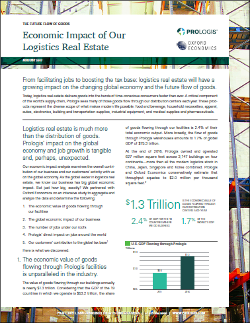Ungated Post | 10 Nov 2017
The Future Flow of Goods

Warehouses and distribution centers facilitate the commercial flow of goods across the world. Nearly every product purchased by consumers and businesses will have passed through a warehouse or distribution facility. Oxford Economics undertook a custom, data-driven assessment of Prologis warehouse and distribution facilities to better quantify and describe the economic value of goods that flow through their facilities, the number of jobs under Prologis roofs, as well as jobs supported through the economic activities of Prologis tenants and the tax implications of all economic activity associated with Prologis’ warehouses and distribution centers.
In 2016, Prologis, the world’s largest owner of warehouses and distribution centers, owned or operated 627 million square feet of warehouse space across 3,147 buildings in 19 countries. Approximately $1.3 trillion worth of goods flow through these facilities annually—which accounts for 1.7% of global GDP. About 816,000 people work under Prologis roofs, specifically for Prologis tenants who lease warehouse and distribution center space. The economic activities of Prologis’ tenants and employees support an additional 1.55 million jobs globally. In context, if the employment supported by Prologis and their tenants were a US city, they would be the fourth largest—ahead of Houston, Philadelphia and Phoenix.
Within the US, the economic activity supported through Prologis warehouses and distribution centers generates about $16.7 billion in federal, state and local taxes.
Oxford Economics’ team is expert at applying advanced economic tools that provide valuable insights into today’s most pressing business, financial, and policy issues.
To find out more about our capabilities, contact:
Americas
Diantha Redd
+1 (646) 503 3052
Email
Asia Pacific
Peter Suomi
+65 6850 0110
Email
EMEA
Aoife Pearson
+44 (0)203 910 8054
Email
Related Services

Post
The economic impact of abandoning the WTO
Oxford Economics have been commissioned by the International Chamber of Commerce (ICC) to provide an independent assessment of the economic impact of WTO dissolution. This report details our findings and the assumptions underpinning our analysis.
Find Out More
Post
The economic impact of the sports activities of public service media
This study shows how the sports activities of public service media supported €4.5 billion of GDP and 57,000 jobs across 31 European countries in 2022. The report also highlights wider economic benefits of public service media sports coverage, such as the way in which it leverages sponsorship income for sports bodies.
Find Out More
Post
Global Trade Education: The role of private philanthropy
Global trade can amplify economic development and poverty alleviation. Capable leaders are required to put in place enabling conditions for trade, but currently these skills are underprovided in developing countries. For philanthropists, investing in trade leadership talent through graduate-level scholarships is an opportunity to make meaningful contributions that can multiply and sustain global economic development.
Find Out More